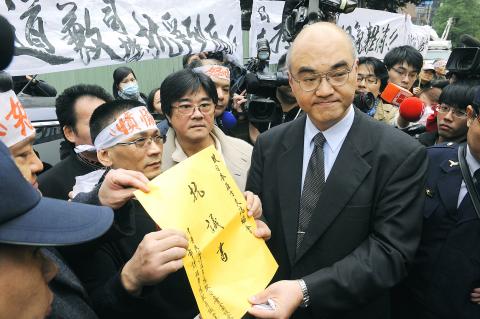The Taipei District Prosecutors’ Office yesterday wrapped up its investigation into a case involving singer-actress Makiyo and her friend Takateru Tomoyori, charging both with assault and asking for four and six years imprisonment respectively over the alleged beating of a taxi driver last week.
The prosecution said it decided to charge Makiyo for assault after reviewing footage from a dashboard camera provided by another taxi driver, which prosecutors said showed that the actress kicking the driver, surnamed Lin (林).
Actresses A-tzu (ㄚ子) and Hsiang Ying (湘瑩), who were in the car, have been charged with providing false testimony.

Photo: George Tsorng, Taipei Times
The incident is believed to have followed the refusal by Tomoyori to fasten his seatbelt, whereupon Lin was allegedly kicked several times by Tomoyori. Lin sustained severe injuries and was hospitalized.
Earlier in the day, a group of about 20 members of the National Taxi Drivers Union submitted a protest letter to the Interchange Association, Japan, in Taipei, asking the association, which serves as the de facto embassy in the absence of official diplomatic ties, to apologize to the nation “for the tensions” caused by the dispute.
Union chief of staff Kuo Ya-hsiung (郭雅雄) said the incident had dragged on for so long and that none of the alleged perpetrators were telling the truth.
“We want dignity! We want the truth!” the protesters shouted, holding banners that said: “Find the truth” and “Violent Japanese drinkers not welcome in Taiwan.”
Although Lin’s case was an isolated incident, Japan’s representative association should say something about a Japanese national beating up a Taiwanese in his own country, said Cheng Chuan-yi (鄭釧義), an executive committee member of the taxi drivers’ association.
“They [the association] should apologize to Taiwanese and Mr Lin to help ease tensions between the two countries [caused by the incident],” Kuo said.
The association sent a representative to accept the protest letter.
In an interview with the Taipei Times, Kuo thanked the media for speaking for the victim and for allowing justice to prevail.
“The media have helped highlight the plight facing the nation’s taxi drivers,” he said.
Lawyer Yu Chun-ru (余俊儒), who was retained by the union to help Lin in the case, said the driver had indicated he would forgive the young people if they truly repented for what they did and told the truth.
People make mistakes and it is one’s attitude after making a mistake that counts, he said.
Since the controversy emerged, Kuo said several taxi drivers had come forward and said they had had Makiyo as a passenger before, adding that they had complained about her behavior. So far, none of the alleged perpetrators have offered compensation to the victim.
“Some things, like dignity, simply cannot be bought with money,” Kuo said.
Several well-known people, including former leader of the Bamboo Union gang “White Wolf” Chang An-lo (張安樂) — who has made public statements about the affair — and Yulon Motor (裕隆汽車) chairman Kenneth Yen (嚴凱泰), have indicated their intent to donate money to Lin.
Chang, a wanted fugitive who has fled to China, is the founder of the China Unification Promotion Party. One taxi association, the Grand Chinese Taxi Association, is affiliated with the party.
His involvement in the matter in Taipei appears to have been made to please China and spark anti-Japanese sentiment.
Meanwhile, the Taipei City Police Department removed two police officials from their posts over the local divisions’ “poor handling” of the evidence in the case.
The department acknowledged its failure to include a video clip in the evidence package given to prosecutors on Friday last week.
The video clip, taken by a taxi driver using his car camcorder, showed clear images of Makiyo shouting at the taxi driver and kicking him several times before being stopped by Tomoyori.
The police department did not present the video clip to the prosecutors until the prosecutors saw the footage on TV on Wednesday and demanded the tape from the department.
Taipei Mayor Hau Lung-bin (郝龍斌) said the head of the Police Department, Huang Sheng-yong (黃昇勇), on Thursday afternoon presented a report on its handling of evidence and the list of personnel to be given punishments for negligence.
Hau also said he instructed the chief to re-examine the list and consider giving more severe punishments, if necessary.
Head of the department’s Sanchangli police station, Yang Kuo-chang (楊國昌), and director of Inspection Division of Xinyi precinct, Su Je-ping (蘇哲平), were removed from their posts.
Police officers who had handled the piece of evidence were also given demerits, according to the list.
“There was administrative negligence in the procedures relating to presenting evidence to the prosecutors, and I think those who are responsible for the mistakes should be punished,” Hau said.
Asked to comment on the singer-actress’ character, some sources within the Japanese community in Taipei said that Makiyo, who is half-Japanese, was not a well-behaved student when she attended the Taipei Japanese School.
Many parents were really troubled by some of her behavior, the source said, such as kissing her boyfriends in school.
The source also used the term “childish” to describe the actions taken by Makiyo and Tomoyori.
“Being drunk should not be used as an excuse,” the source said, referring to Makiyo. “We are embarrassed by Tomoyori’s chauvinistic behavior as well; he is really the shame of Japan.”
With translation by Jake Chung, Staff Writer, and additional reporting by CNA

The Central Weather Administration (CWA) yesterday said it expected to issue a sea warning for Typhoon Fung-Wong tomorrow, which it said would possibly make landfall near central Taiwan. As of 2am yesterday, Fung-Wong was about 1,760km southeast of Oluanpi (鵝鑾鼻), Taiwan’s southernmost point, moving west-northwest at 26kph. It is forecast to reach Luzon in the northern Philippines by tomorrow, the CWA said. After entering the South China Sea, Typhoon Fung-Wong is likely to turn northward toward Taiwan, CWA forecaster Chang Chun-yao (張峻堯) said, adding that it would likely make landfall near central Taiwan. The CWA expects to issue a land

Taiwan’s exports soared to an all-time high of US$61.8 billion last month, surging 49.7 percent from a year earlier, as the global frenzy for artificial intelligence (AI) applications and new consumer electronics powered shipments of high-tech goods, the Ministry of Finance said yesterday. It was the first time exports had exceeded the US$60 billion mark, fueled by the global boom in AI development that has significantly boosted Taiwanese companies across the international supply chain, Department of Statistics Director-General Beatrice Tsai (蔡美娜) told a media briefing. “There is a consensus among major AI players that the upcycle is still in its early stage,”

The Central Weather Administration (CWA) yesterday said it is expected to issue a sea warning for Typhoon Fung-wong this afternoon and a land warning tomorrow. As of 1pm, the storm was about 1,070km southeast of Oluanpi (鵝鑾鼻), Taiwan’s southernmost point, and was moving west-northwest at 28 to 32kph, according to CWA data. The storm had a radius of 250km, with maximum sustained winds of 173kph and gusts reaching 209kph, the CWA added. The storm is forecast to pass near Luzon in the Philippines before entering the South China Sea and potentially turning northward toward Taiwan, the CWA said. CWA forecaster Chang Chun-yao (張峻堯) said

Japanese Prime Minister Sanae Takaichi yesterday said that China using armed force against Taiwan could constitute a "survival-threatening situation" for Japan, allowing the country to mobilize the Japanese armed forces under its security laws. Takaichi made the remarks during a parliamentary session while responding to a question about whether a "Taiwan contingency" involving a Chinese naval blockade would qualify as a "survival-threatening situation" for Japan, according to a report by Japan’s Asahi Shimbun. "If warships are used and other armed actions are involved, I believe this could constitute a survival-threatening situation," Takaichi was quoted as saying in the report. Under Japan’s security legislation,